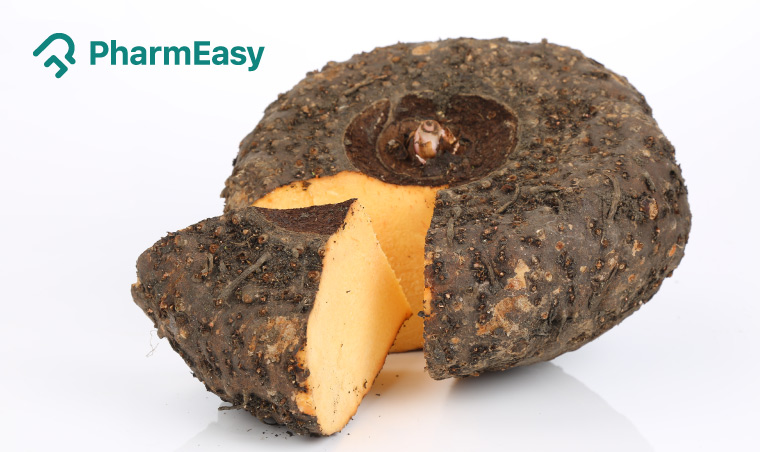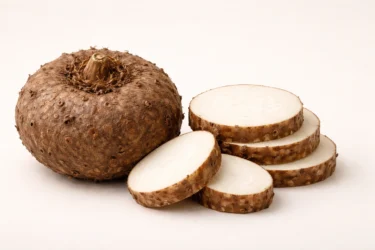Elephant Yam (Suran): Uses, Benefits, Side Effects and More!
By Dr Smita Barode +2 more

Get,

to manage your symptom
Get your,


4 Cr+ families
benefitted

OTP sent to 9988776655



You’ve successfully subscribed to receive
doctor-approved tips on
Whatsapp

Get ready to feel your best.

Hi There,
Download the PharmEasy App now!!


Register to Avail the Offer
Send OTPBy continuing, you agree with our Privacy Policy and Terms and Conditions

Hi There,
Sign up on PharmEasy now!!
Trusted by 4 crore+ families

OTP sent to 9988776655



You have unlocked 25% off on medicines




Code: NU25
By Dr Smita Barode +2 more
Table of Contents
Elephant yam is commonly known as suran or jimikand. Its scientific name is Amorphophallus paeoniifolius and belongs to family Araceae. Three local varieties of elephant yam are found in India, namely Gajendra, Sree Padma and Kusum. It is a local staple food in several countries and is cultivated as an intercrop with turmeric and bananas. Elephant yam is the herbaceous, perennial crop of south-eastern Asian origin and has attained the status of cash crop in India1,2. Elephant yam is a potential tropical tuber crop. Mainly, the tuber of elephant yam is rich in nutrients. The tubers of elephant yam are extremely acrid and irritate the mouth and throat because of excessive calcium oxalate content3. Read more about the health benefits of elephant yam.

Did you know?
100 grams of elephant yam provides the following amount of nutrients4:
Several studies have found that different parts of elephant yam may have potential properties as those mentioned below:
I’ll let you in on a little secret. The elephant yam has another amazing benefit up its sleeve! It’s been found to contain a high amount of omega fatty acids. Now, these fatty acids might be extremely beneficial for our bodies, especially when it comes to regulating our good cholesterol levels. They may do a fantastic job of keeping our hearts happy and healthy12.
Dr. Siddharth Gupta, B.A.M.S, M.D (Ayu)
Elephant yam has been used in Ayurveda and Folk medicine6. It has several uses as described:

The ability of elephant yam to lower sugar levels has been proven experimentally. Elephant yam contains flavonoids that may stimulate the secretion of insulin. Elephant yam may help minimise complications related to diabetes. However, consult your doctor for a proper diagnosis in case of high blood sugar7.

The tuber of elephant yam may help relieve pain. The analgesic activity of elephant yam extract was evaluated on mice. Elephant yam may inhibit the synthesis of prostaglandins, which are responsible for inflammation. It may be used to reduce the side effects of conventional analgesics as an add-on drug8. Consult a doctor if the pain lasts long and is unbearable instead of self-medication.

Elephant yam is used in traditional medicine for gastrointestinal disorders like piles, abdominal pain and constipation. The property of increasing gastrointestinal motility has been tested on Wistar rats. It was proven that elephant yam increases motility in the stomach (gastrokinetic action); therefore, it may be used to treat gastrointestinal disturbances2.

The extract of elephant yam was used to determine its antifungal and antibacterial properties. It showed significant antibacterial activity against some gram-negative and gram-positive bacteria. A phytoconstituent present in elephant yam may possess antibacterial and antifungal activity, which may treat infections caused by microorganisms5.

The elephant yam tuber may possess the properties to destroy parasitic worms. Studies5 to test the anthelmintic activity of elephant yam against earthworms showed that it may paralyze and kill the earthworm5. There are a variety of parasites that affect humans and these studies seem insufficient to define the extent to which elephant yam will be beneficial to humans.

The flavonoid quercetin, which was isolated from elephant yam, may prevent liver damage. Studies conducted on the rat liver to evaluate the hepatoprotective properties showed that elephant yam might bring down the increased enzyme level, increase the protein level and improve the texture of the damaged liver cells5. This indicates it may have some effect on the human liver, but human studies are needed to establish this. You must consult your doctor for advice on any liver-related condition.

There may be a potential use of elephant yams for weight loss. Elephant yam can be a part of several healthy recipes. Roasting elephant yam may be preferred over boiling it to preserve the nutrients. Elephant yam may have an excellent nutritional value, making it a healthy food choice9. However, do not make any changes in your diet without consulting a nutritionist.

Elephant yam may be effective against ulcerative colitis. A study10 conducted on Wistar rats showed that certain phytoconstituents present in elephant yam might exhibit anti-colic effects.
Though studies show the benefits of the herb in various conditions, these are insufficient, and there is a need for further studies to establish the true extent of the benefits of herbs on human health.
Judging from what I’ve witnessed, elephant yam may have impressive effects on our digestive system. It’s a real multitasker! It has been known to potentially address various digestive issues such as vomiting, loss of appetite (anorexia), and indigestion (dyspepsia). It might be like a magical remedy for common stomach troubles.
Dr. Rajeev Singh, BAMS
Elephant yam can be used in the following ways:
You must consult a qualified doctor before taking any herbal supplements. Do not discontinue or replace an ongoing treatment of modern medicine with an ayurvedic/herbal preparation without consulting a qualified doctor.
A few elephant foot yam side effects that were observed in studies are:
Moreover, if you experience any additional adverse reactions to elephant yam, immediately contact a doctor or your Ayurvedic physician who has prescribed it. They will be able to guide you appropriately for your symptoms.
Also Read: Zucchini (Courgette): Uses, Benefits, Side effects and More!
General precautions should be taken while having elephant yam as any other general medicine. Special care should be taken by pregnant women and lactating mothers. You must consult your doctor before having elephant yam. Precaution should be taken before giving elephant yam to elderly or children. In such cases, you must have elephant yam only if it is prescribed by your doctor.
Also Read: Star Anise (Chakra Phool): Uses, Benefits, Side Effects and More!
There is not enough evidence on interaction of elephant yam with other drugs. Further studies on interaction of elephant foot yam are required. Therefore, it is essential to consult your doctor if you are on any other medication before consuming elephant foot yam.
There is a need for more research as there is not enough evidence on interaction of elephant yam with other drugs. Therefore, it is essential to consult your doctor if you are on any other medication before consuming elephant foot yam.
Elephant foot yam may be potentially used to treat diabetes, liver, and gastrointestinal diseases5. It may also be used as an antifungal, antibacterial and anthelmintic5. The side effects of elephant yam may be itching and burning sensation in the mouth, pruritis, erythema, wheal on external skin or hands, may cause urinary oxalate secretion and may increase the amount of faeces. You must seek immediate medical help if you experience any of these side effects.
Elephant yam contains fats, proteins, dietary fibres, calcium, magnesium, sodium, potassium, other minerals, and phytoconstituents5.
No, as of now, no studies have shown use of elephant yam for Covid-19.
Elephant yam may have cytotoxic property (ability to kill cells which can be beneficial in tumour growth), therefore elephant yam may be used for cancer5 .However, cancer is a serious health condition and requires proper diagnosis and treatment. Therefore, a doctor’s consultation is necessary.
Disclaimer: The information provided here is for educational/awareness purposes only and is not intended to be a substitute for medical treatment by a healthcare professional and should not be relied upon to diagnose or treat any medical condition. The reader should consult a registered medical practitioner to determine the appropriateness of the information and before consuming any medication. PharmEasy does not provide any guarantee or warranty (express or implied) regarding the accuracy, adequacy, completeness, legality, reliability or usefulness of the information; and disclaims any liability arising thereof.
Links and product recommendations in the information provided here are advertisements of third-party products available on the website. PharmEasy does not make any representation on the accuracy or suitability of such products/services. Advertisements do not influence the editorial decisions or content. The information in this blog is subject to change without notice. The authors and administrators reserve the right to modify, add, or remove content without notification. It is your responsibility to review this disclaimer regularly for any changes.
Comments

Leave your comment...
You may also like
Comments